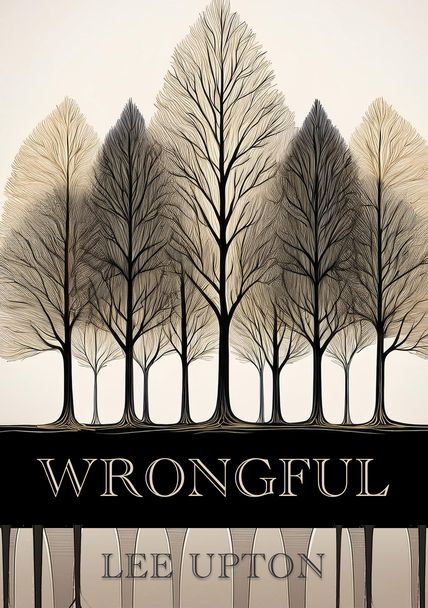Missing Mira: A Review of ‘Wrongful’ by Lee Upton
By Jordan Blum
Posted on

It’s not often that a writer is equally adept at poetry, fiction, nonfiction, and literary criticism, yet Lee Upton has been an exception to the rule for over a decade. Unsurprisingly, her latest novel—Wrongful—only cements that fact, as it’s a thoroughly stirring and imaginative but realistic mystery/character study (in the self-aware vein of Agatha Christie) that exemplifies her many talents.
Per the official synopsis:
When the famous novelist Mira Wallacz goes missing at the festival devoted to celebrating her work, the attendees assume the worst—and some hope for the worst. Ten years after the festival, Geneva Finch, an ideal reader, sets out to discover the truth about what happened to Mira Wallacz. A twisty literary mystery dealing with duplicity, envy, betrayal, and love between an entertainment agent and a self-deprecating former priest, Wrongful explores the many ways we can get everything wrong, time and again, even after we’re certain we discovered the truth.
Indeed, Wrongful wastes no time pulling readers in with its intriguing players, setting, and situations, and despite some admittedly subjective and minor faults, it lives up to that potential until the very end.
Its greatest asset is its main protagonist – Geneva – who investigates Mira’s history and the people she knew with the quirkiness and obsessiveness of Christina Ricci’s Misty on TV show Yellowjackets. Granted, she’s more endearingly self-deprecating (and less psychotically threatening), but anyone who’s familiar with the show will probably draw comparisons by the time Geneva’s quest gets going.
Of course, that’s not to say that Upton’s text is at all derivative, but rather to suggest a frame of reference for anyone who’s delving into both properties at the same time. In fact, the coincidental connections between Wrongful and Yellowjackets continue in how the aforementioned former priest (Thom) somewhat evokes Misty’s probing partner (Elijah Wood’s Walter), as well as how the various women Geneva speaks to are basically frenemies who’ll talk and act behind each other’s backs to portray themselves as Mira’s most important, knowledgeable, and/or concerned associate.
For instance, and early on, another character – Yolanda – declares: “I probably know Mira more than anybody here.” Shortly thereafter, and during a different conversation, she remarks:
She’s [Mira] always been a tease – a difficult person to deal with. An airy sort of person. I used to talk to her about tree spirits. She’d scoff and then whatever I said turned up in her writing. She really does use me for her work—a little too much. Friendship like that can be hard.
That said, it’s Mira’s agent, Stephanie Binks, who later professes:
I helped her [Mira] with her plots—no one knows about that. I just had to suggest a few essential things to her and then, gradually, she developed my idea into a plot. The originating ideas, those were always mine. . . . I’ve always been very good at coming up with suggestions. I was used, frankly.
There’s an alluring self-serving nature to several people in the book that aids in making Upton’s central whodunit absorbing and in making each personality believably complex and authentic.
Although not at the forefront of the story, Wrongful also peppers in some astute (and even humorous) commentaries about the publishing industry, writing conferences, and the duality of being an author who serves two drastically different audiences (such as simultaneously writing children’s books and sexually explicit crime thrillers). They’re never too “inside baseball” to alienate outsiders, but readers who’re involved in the industry as well will be especially appreciative of those moments.
As already demonstrated by the excerpts above, Wrongful is also very well written in terms of striking a virtually perfect balance between accessibility and sophisticated eloquence. At no point does Upton sound like she’s trying to impress with overly academic language or style, yet her descriptions are always eloquent and fluid (just as her characters think, behave, and converse with credible fluidity/practicality and vividness).
Expectedly, Wrongful gets progressively more interesting, relatable, and surprising as it goes, with the majority of figures – including Mira – becoming commendably multifaceted and empathetic during the second half (whether of their own accord or through what others say about them). Likewise, various revelations, explanations, motivations, and the like leave a lot to contemplate once the book is over.
Nonetheless, no creative work is perfect, and Wrongful does suffer a bit from a meandering pace during its middle (or second act, between the inciting incidents and final resolutions). It’s never outright boring or aimless, but Geneva’s mission to solve what happened to Mira is slightly drawn-out and repetitious. In other words, it feels like it’s spinning its wheels a tad, so better pacing (with more time spent on the implications and consequences of what transpired) would help.
Along the same lines, the book can feel too convoluted by the end due to its numerous red herrings, answers, etc. It’s still easy enough to follow and remain engaged – and Upton is undeniably clever in tying things together – yet there are one or two times that the book forces you to ask, “Wait, what happened there?” and “Wait, why did they do or say that back then?”
Minor gripes aside, Wrongful is another triumph for Upton, whose captivating core mystery is realized through lovely prose and enhanced by a wide array convincingly multilayered and morally shaky characters. If you’re already a fan of Upton, you’ll surely adore what she’s done here, and if not, you almost certainly will be as soon as you finish the first chapter.